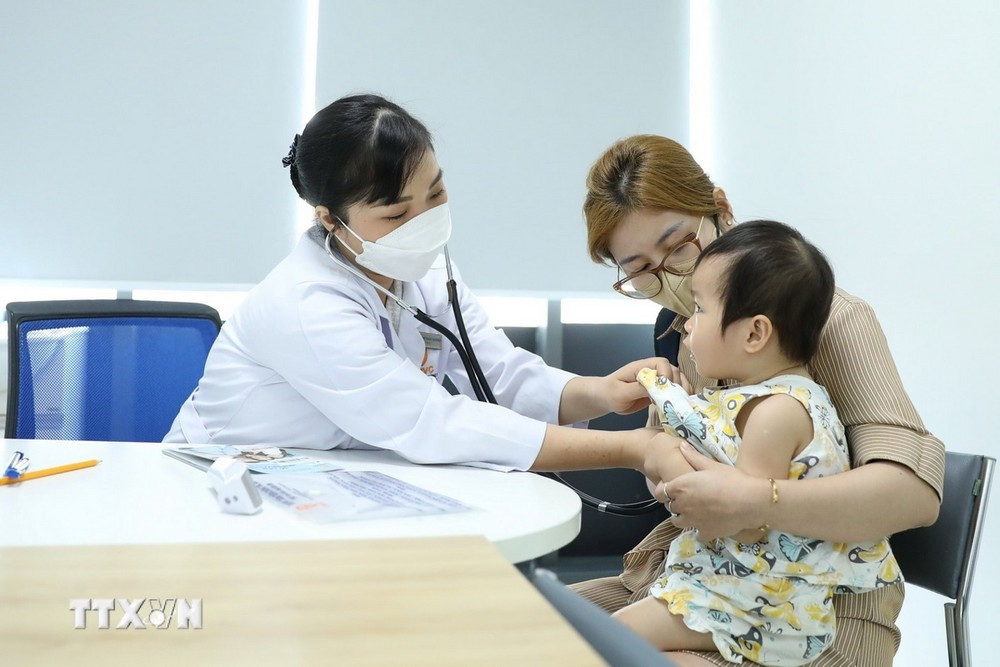Supporting children's resistance during erratic weather is very important. It will help their bodies fight pathogens, reduce the risk of disease and reduce complications.

The erratic weather changes, from hot to cold, from sunny to rainy during the changing seasons will affect health, especially in children whose resistance is not yet complete.
According to WHO, there are about 1 billion cases of seasonal influenza each year, including 3-5 million cases of severe illness and 290,000-650,000 deaths.
In Vietnam, in 2023, the whole country recorded 289,066 cases of seasonal flu; 4 major hospitals in Ho Chi Minh City alone (Hospital for Tropical Diseases and 3 children's hospitals) received 238,000 cases of respiratory diseases in children due to changes in the weather. Therefore, parents need to pay attention and apply measures to prevent diseases caused by erratic weather to protect their children's health.
The body's resistance or immunity is the ability to defend against the invasion of harmful agents such as viruses, bacteria, parasites, etc. When resistance is reduced, the child's body will be more susceptible to disease. Therefore, supporting the child's resistance at this time will help the child's body to be able to fight pathogens, limit the risk of disease and reduce complications.
This is also essential for children to develop healthily and is a solid foundation for future health. In particular, young children with weak immune systems are susceptible to illness when the weather changes from hot to cold.

The erratic weather conditions, sudden changes in temperature between day and night are ideal conditions for many types of harmful viruses and bacteria to develop. They cause a number of diseases that significantly affect the health of children.
Flu
Flu is the most common condition when the weather is erratic. Children may have fever, stuffy nose, sore throat, cough, sneeze and cry. If parents do not know how to handle a runny nose that lasts for a long time, there is a risk of phlegm going down the throat, causing pharyngitis and more seriously, bronchitis.
Upper respiratory tract infection
Viral diseases with common symptoms such as fever, sore throat with cough, runny nose and sneezing. However, some children have severe respiratory infections but no fever or low fever, especially children with rickets, malnutrition accompanied by fussiness and poor sleep. Typical diseases help detect children at risk of upper respiratory infections such as pharyngitis, sinusitis and allergic rhinitis.
Otitis media
Unstable weather increases the risk of children suffering from otitis media, with symptoms such as pain, hearing loss, discharge, high fever, and even nausea. If not treated promptly, children with otitis media can experience very dangerous complications such as hearing loss, perforated eardrum, and meningeal abscess.

Dengue fever
Dengue fever is a mosquito-borne disease. When children are infected, they will have common symptoms such as sudden high fever and continuous for about 2-4 days, there may be bleeding under the skin, in the oral mucosa, more severe is bloody urine... In particular, children with dengue fever have many dangerous complications, such as the risk of gastrointestinal bleeding, cardiovascular collapse, cerebral hemorrhage, coma leading to death.
Chickenpox
This is an acute infectious disease caused by the Varicella Zoster virus (VZV). The initial symptoms of chickenpox are fever, headache, and aches, followed by rashes and blisters. The blisters may crust over after about 2-3 days. Parents should note that chickenpox can also cause dangerous complications for children, such as skin infections, blood infections, and encephalitis.
Acute diarrhea
The disease is caused by viruses, bacteria or parasites; it usually appears suddenly and most children with the disease often have a high fever (38-40 degrees Celsius) and symptoms such as runny nose, stuffy nose, sneezing, cough and sore throat. In addition, typical symptoms such as loose stools, vomiting, abdominal pain and dehydration indicate that the child has acute diarrhea due to intestinal disease.
Resistance plays a very important role for the body, acting as a barrier to help the body prevent harmful agents. For children, resistance helps protect them from infection and disease. It also creates a foundation for children to develop comprehensively from physical to mental.
Parents can take the following measures to increase their children's resistance, thereby helping to prevent diseases for children when the weather changes.
Reasonable diet
Ensure nutrition, feed children a balanced diet of nutrients and pay attention to protein and micronutrients. Zinc and iron are two extremely important micronutrients found in beef, chicken, fish, eggs and seafood. In addition, form the habit of eating lots of vegetables and fruits, drinking fruit juice to supplement vitamin A, vitamin B, vitamin C and other minerals.
Use properly prepared, hygienic foods and pay attention to food portion sizes.
For young children, children 0-6 months old should be breastfed exclusively to have the ability to prevent disease and develop most comprehensively. If conditions are not available, mothers should try to breastfeed their children for at least the first 2-3 months to strengthen their immune system.

Supplement probiotics
Gut bacteria play a very important role in resistance and can be affected by antibiotic use. Therefore, after each course of antibiotic treatment, pediatricians often recommend that parents give their children probiotics. However, before using, parents should consult a doctor to know how and when to use them.
Vaccination
Parents should pay attention to vaccinating their children on schedule and with enough doses as recommended by the Ministry of Health. Take the initiative to vaccinate children against influenza, especially those over 6 months old because influenza is often transmitted through the respiratory tract and the effectiveness of vaccination is 96%-97%. In addition, vaccinated children who get the flu may have a milder illness and a shorter illness duration than unvaccinated children.
Give children oral doses to prevent acute diarrhea caused by rotavirus, especially in the group under 6 months and the first dose is given at 2 months of age.

Change your lifestyle
Parents should pay attention to their children's clothing during the day to ensure they always keep their bodies warm, especially at night. The room temperature should be maintained at 25-28 degrees Celsius, well-ventilated and avoid drafts.
Encourage your child to participate in age-appropriate sports and recreational activities. Regular exercise helps children develop physically, increase blood circulation, improve heart and lung function, and thereby enhance resistance.
Limit children's exposure to sources of pollution such as dust and cigarette smoke.
Clean the environment around the child. Make sure the living environment is clean and airy.
Form personal hygiene habits for children such as cutting fingernails and toenails; regularly washing hands with antibacterial soap; using saline to clean nose and throat daily; bathing and cleaning the body daily.
Parents need to ensure that their children get enough sleep of 9-12 hours per day depending on their age. In addition, the child's bedroom must be airy, have enough light and maintain a certain humidity to help the child not have difficulty breathing.
Minimize your child's exposure to people who are showing signs of infectious diseases such as flu, respiratory diseases and acute diarrhea.
It is recommended to wear a mask when going out in public, especially when showing signs of illness.
TB (according to Vietnam+)